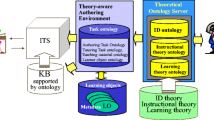Abstract
This article deals with advanced topics of ontological engineering to convince readers ontology is more than a rule base of terminological problems and is worth to consider a promising methodology in the next generation knowledge processing research. Needless to say, ontology in AI is tightly connected to ontology in philosophy. The first topic here is on philosophical issues which are very important to properly understand what an ontology is. After defining class, instance andis-a relation, we point out some typical inappropriate uses ofis-a relation in existing ontologies and analyze the reasons why. Other topics are basic ontological distinction, part-of relation, and so on. As an advanced example of ontology, an ontology of representation is extensively discussed. To conclude this tutorial, a success story of ontological engineering is presented. It is concerned with a new kind of application of ontology, that is, knowledge systematization. An ontology-based framework for functional knowledge sharing has been deployed into a company for two years and has been a great success. Finally, future of ontological engineering is discussed followed by concluding remarks.
Similar content being viewed by others
References
http://ontology.teknowledge.com:8080/rsigma/dialog-3d-4d.html
Guarino, N. and Welty, C., “Evaluating Ontological Decisions with OntoClean,”Communications of the ACM, 2, 45, pp. 61–65, 2002.
Guarino, N., “Some Ontological Principles for Designing Upper Level Lexical Resources,” inProc. of First International Conference on Language Resources and Evaluation, ELRA — European Language Resources Association, pp. 527–534, Granada, Spain, 1998.
Chandrasekaran, B. and Josephson, J. r., “Function in Device Representation,”Engineering with Computers, 16, 3/4, pp. 162–177, 2000.
Hubka, V., Eder, W. E.,Theory of Technical Systems, Berlin, Springer-Verlag, 1998.
Hubka, V., Eder, W. E., “Functions Revisited,” inProc. of ICED 01, 2001.
Kitamura, Y., Sano, T., Namba, K. and Mizoguchi, R., “A Functional Concept Ontology and Its Application to Automatic Identification of Functional Structures,”Advanced Engineering Informatics, 16, 2, pp. 145–163, 2002.
Kitamura, Y. and Mizoguchi, R., “Ontology-based Description of Functional Design Knowledge and Its Use in a Functional Way Server,”Expert Systems with Application, 24, 2, pp. 153–166, 2003.
Mizoguchi, R. and Kitamura, Y., “Foundation of Knowledge Systematization: Role of Ontological Engineering,”Industrial Knowledge Management — A Micro Level Approach (Rajkumar R. ed.), Ch. 1, pp. 17–36, Springer-Verlag, 2000.
http://www.opencyc.org/
Pahl, G. and Beitz, W.,Engineering Design — A Systematic Approach, The Design Council, 1988.
Winston, M. E., Chaffin, R. and Herrmann, D., “A Taxonomy of Part-whole Relations,”Cognitive Science, 11, pp. 417–444, 1987.
Author information
Authors and Affiliations
Additional information
Riichiro Mizoguchi, Ph.D.: He is Professor of the Department of Knowledge Systems, the Institute of Scientific and Industrial Research, Osaka University. He received his B.S., M.S., and Ph.D. degrees from Osaka University in 1972, 1974 and 1977 respectively. From 1978 to 1986 he was research associate in the Institute of Scientific and Industrial Research, Osaka University. From 1986 to 1989 he was Associate Professor there. His research interests include Non-parametric data analyses, Knowledge-based systems, Ontological engineering and Intelligent learning support systems. He is a member of the Japanese Society for Artificial Intelligence, the Institute of Electronics, Information and Communica-tion Engineers, the Information Processing Society of Japan, the Japanese Society for Information and Systems in Education, Intl. AI in Education (IAIED) Soc., AAAI, IEEE and APC of AACE. Currently, he is President of IAIED Soc. and APC of AACE. He received honorable mention for the Pattern Recognition Society Award, the Institute of Electronics, Information and Communication Engineers Award, 10th Anniversary Paper Award from the Japanese Society for Artificial Intelligence and Best paper Award of ICCE99 in 1985, 1988, 1996 and 1999, respectively. He can be reached at miz@ei.sanken.osaka-u.ac.jp
About this article
Cite this article
Mizoguchi, R. Part 3: Advanced course of ontological engineering. New Gener Comput 22, 193–220 (2004). https://doi.org/10.1007/BF03040960
Received:
Issue Date:
DOI: https://doi.org/10.1007/BF03040960




